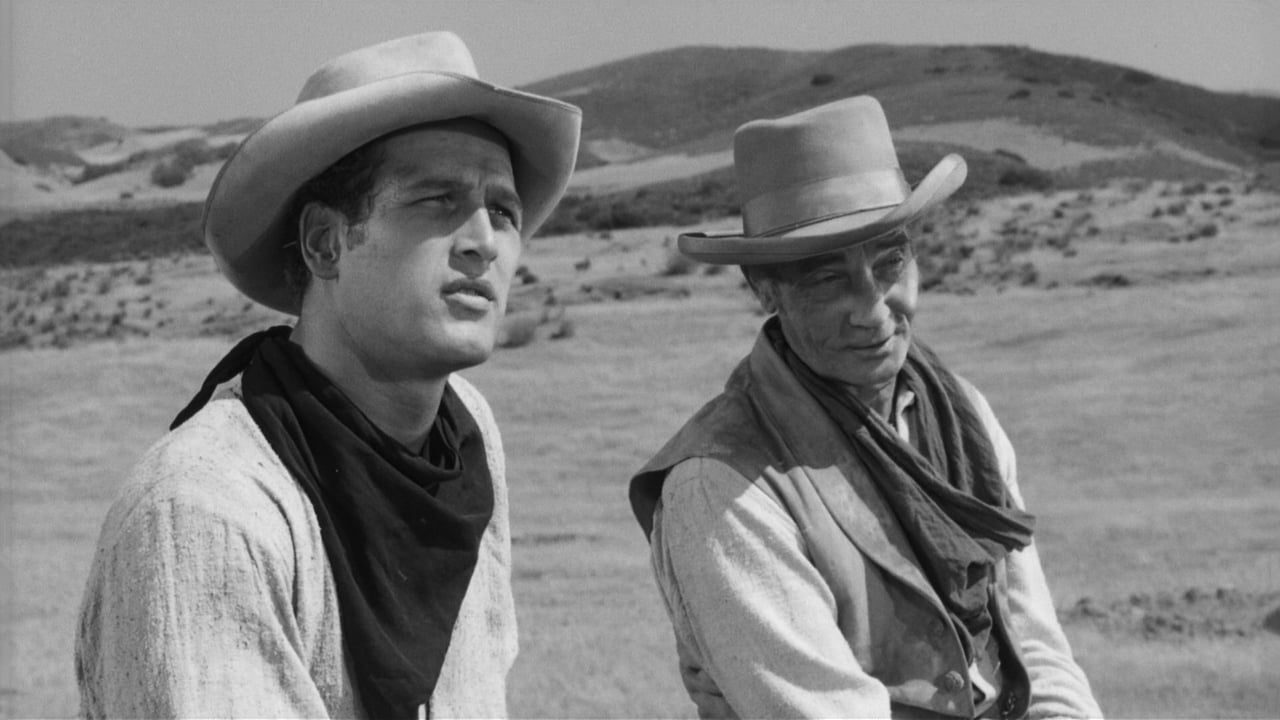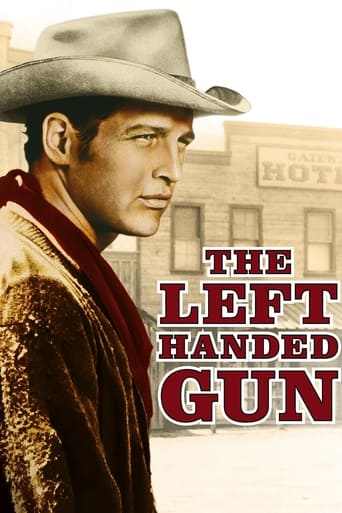

There is an oft-told story of how Paul Newman took out a full-page ad to apologise for his performance in his first film, "The Silver Chalice" when it was first shown on television. Wether this is true, or apocryphal. I don't know ? {Has anyone ever seen a copy of it??).Now, anyone who has seen "The Silver Chalice" knows that Newman did not do that bad a job in the film. For a first attempt,it's ok. The movie is pure hokum but, most of these "Sword & Sandle" Epics were. (What it does have is amazing and wonderfully stylised art direction, which keeps you watching!)In my opinion, it is this, his third film, for which he should be humbly apologising. Originally planned by Warners for James Dean, it is risible, to say the least!Newman gives an almost comic (and terrible!) impression of both Brando and Dean combined, which grows more and more hysterical until its "I AIN'T got the bullets" finale. I think the only Brando cliche he doesn't utilise is the "I could'a bin a contender" line?Penn must take most of the blame for encouraging Newman to ham it up like this. It is like an over-long episode of one of Warners' TV Cowboy shows that were so popular at the time ("Cheyenne",etc).Don't get me wrong. I've always been a big fan of Newman's...... he did some terrific stuff in his career. But.... this one would try anyone's patience.
... View MoreI guess, if you really like westerns, you can give The Left Handed Gun a try. I'm not a die-hard fan of the genre, so the movie has to be really riveting for me to enjoy it, like Gunfight at the O.K. Corral, or the remake of 3:10 to Yuma. If you're like me, stick to the exciting ones, because The Left Handed Gun isn't one of them.Paul Newman plays Billy the Kid, a somewhat spastic murdering cowboy. He relies on his sidekicks when he's in a jam, enjoys his women when he's in the mood, and shoots his enemies when they're in his way. That's pretty much it. It's not particularly exciting, and if you like to see Paul Newman as a bad boy, there are countless others for you to choose from.To be fair, there is one scene towards the end (no spoilers, don't worry) that is very good. While many people die in this film, one person dies a slow death in this particular scene, and it's pretty sad. Paul Newman finally shows remorse over this death, and in this one scene he's allowed to act for the camera, as opposed to the rest of the film.
... View MoreThis Film has Many Interesting Elements that may Attract Viewers. Director Arthur Penn's Debut, Early Paul Newman as an Iconic Western Outlaw, and a Different Artistic Approach to the Conventional Western.However, the Movie is not the Easiest to Like. Penn's Flourishes are Welcome in a Genre so Ripe with Regularity, but Newman Overacts to the Point of Silliness and can Grate on the Nerves. In Fact, just about Every Actor Emotes to Extreme, Except Perhaps John Dehner as Pat Garrett who Strikes a Concerned Lawman's Pose Quite Well Without Words. But even He is Guilty of One Scene that is Downright Atrocious (the this is my wedding, this is my town part).Visually the Film has Many Interesting Shots and Flourishes, but Newman's Exaggeration of Body Language and Other Fanciful Displays that Misfire bring the Movie Down to just Above Average. There is Enough Curiosity here that is Worth a Watch, but Overall it is the Over Baked Acting that makes this a Disappointment.
... View MoreThe notorious outlaw William Bonney, aka Billy the Kid, has been the subject of a number of films. Sam Peckinpah's "Pat Garrett and Billy the Kid" and Howard Hughes's "The Outlaw" are among the better-known ones. He also appears, although not as the main character, in Andrew V. McLaglen's "Chisum". Arthur Penn's "The Left Handed Gun" is a lesser- known treatment of the story; the title refers to the belief (probably incorrect) that Billy was left handed. The film starts with Billy's involvement in the Lincoln County War, a range war which took place in New Mexico in 1878. Billy is befriended and taken on as a ranch hand by a kindly cattle boss named Tunstall, who is later murdered by rival cattlemen in league with a corrupt local sheriff. Billy swears revenge and plans to hunt down and kill all the men responsible for his friend's death. His actions, however, jeopardise the territorial amnesty proclaimed by New Mexico governor Lew Wallace, and bring him into conflict with the local population and with his former friend Pat Garrett. A sub-plot involves a journalist named Moultrie who, much to Billy's disgust, sends romanticised and highly exaggerated material back East, leading to the creation of the "Billy the Kid legend". In the film Tunstall is referred to as 'The Englishman', even though he speaks with a Scottish accent and it is stated that he comes from Ayrshire. This is presumably a mistake on the part the characters rather than a goof by the film-makers and the scriptwriter Gore Vidal; like many foreigners, Billy and the other Americans make the common mistake of confusing "English" with "British". In reality John Henry Tunstall actually was an Englishman, from London, and far from being elderly was only 25 at the time of his death. The idea of portraying him as an older father-figure to Billy may have influenced a similar treatment of the character in "Chisum". Penn, who died two years ago, is perhaps best remembered today for his "Bonnie and Clyde", the story of two other notorious outlaws. That film, made in 1967, caught the Zeitgeist of the late sixties, portraying its protagonists as misunderstood young people, essentially as hippies born before their time. Likewise, "The Left Handed Gun" portrays Billy the Kid as a psychologically troubled teenager, a "rebel without a cause" transferred from the 1950s to the 1870s. Indeed, the role was originally intended for James Dean, the original "rebel without a cause", and only went to Paul Newman after Dean's death in a car crash. The film also looks forward to the sixties in another way. It is an early example of a revisionist Western which seeks to get away from the "heroic myth" of the Old West and to present a more morally nuanced view of the period, in the same way as the makers of films noirs were bringing a note of moral ambiguity to modern crime dramas. In many earlier Westerns Billy would have been presented as a heroic avenger, but not here. The men who murder Tunstall may be evil and corrupt, but that does not mean that Billy is justified in taking the law into his own hands to seek revenge. By doing so, he only brings about tragedy for himself and others. Penn may have chosen to make the film in black-and- white, at a time when colour was increasingly the norm in the Western genre, to suggest a link with film noir. (William Wyler's "The Big Country", another Western from 1958, also seeks to blur the once-sharp distinction between heroes and villains, but Wyler's film is in full colour). In one sense, Newman was miscast as Billy; he would have been 33 in 1958, whereas his character was only 18 during the Lincoln County War and died at the age of 21. This was not Newman's best performance of his career- indeed, it was not his best performance of 1958. He gave better ones in two better films made in the same year, "The Long Hot Summer" and "Cat on a Hot Tin Roof". Nevertheless, he shows plenty of the charisma which made him such an exciting new star in the late fifties, despite his inauspicious start to his film career in "The Silver Chalice", and is convincing enough as the troubled young man to make us overlook the discrepancy in age between actor and character. The film was a box-office flop in the United States, which is perhaps not surprising. It is rather dull and downbeat compared to many Westerns of the period, the narrative can at times be difficult to follow and few, if any, of the supporting performances have anything like the intensity of Newman's. It has occasional points of interest, but is not a film in the sane class as "Bonnie and Clyde", and certainly not in the same class as "The Big Country". 5/10
... View More